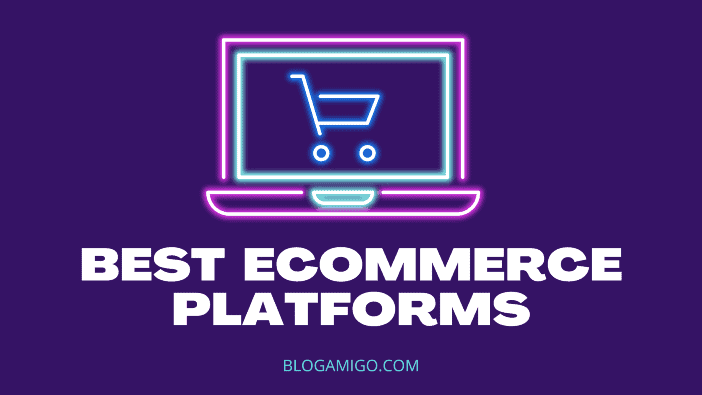Choosing the best eCommerce platform for your business can be quite challenging with an increasing number of online platforms now available.
Are you looking for an eCommerce platform that fits your business goals? You are in the right place. This article will help you streamline your decision process. I will discuss the best eCommerce store you should consider, their pricing, pros, and cons.
If you happen to still be stuck with the options available here, I encourage you to take a step further to create a shortlist and sign up for free trials. Use the platform simultaneously and see which one best suits your needs.
What are eCommerce platforms?
An e-commerce website is a kind of website which usually works as a platform for selling and purchasing various services and products. To create an online store, you need to have software, which works as a bridge between the store and the seller. These software are called eCommerce platforms.
This is your guide for choosing the best eCommerce platforms for your online store. These best 10 eCommerce platforms will allow you to sell products and make money without having to leave home.
1. BigCommerce
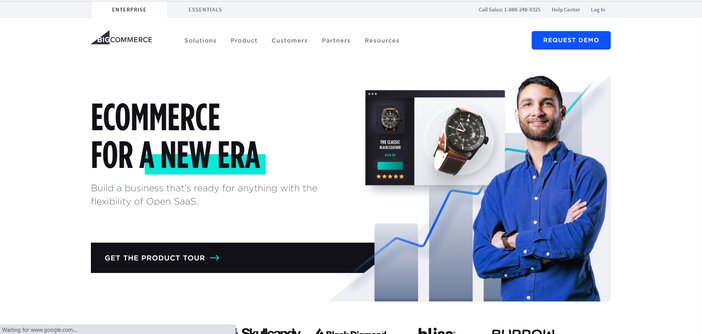
eCommerce platforms such as BigCommerce allow businesses of all sizes to start, grow, and evolve their online presence. In addition to real-time quotations, flexible delivery options, a wide variety of products, and discounting options, this platform also offers coupons.
Furthermore, BigCommerce streamlines the process of shipping pricing calculation with ShipperHQ, a powerful software for shipping pricing rules. More than 10,000 B2C and B2B businesses and companies use the platform to create a great online store.
Pros
- Using BigCommerce is free and easy. They support a wide range of payment methods.
- A 30-day free trial
- Provides support for SEO
- Platform security is excellent
- Selling through multiple channels
Cons
- To change BigCommerce templates, you might need some experience with CSS or HTML
- The POS system has no native features that may need integration
- A limited number of free themes
- Fees for store owners increase as their revenue increases
Pricing
BigCommerce has four pricing plans to choose from, as well as a 15-day free trial. Annual payments for either the ‘Plus’ or ‘Pro’ plans include a 10% discount.
- Standard: starts at $29.95/month
- Plus: starts at $79.95/month
- Pro: starts at $299.95/month
- Enterprise: pricing varies, depending on your business requirements
2. Shopify

After Shopify’s introduction in 2006, the platform has steadily risen to become one of the most popular eCommerce platforms. It offers a wide range of payment methods, such as credit cards, Bitcoin, PayPal, and multiple payment gateways.
Furthermore, the platform includes marketing and SEO tools that will help you make your store visible to search engines such as Yahoo, Google, and Bing. You can add URL links, keywords, and more to each product page’s SEO settings through the automation function.
Pros
- SEO and marketing features
- Social selling features like Facebook Shop, Facebook Pins, and Facebook Messenger
- The largest app store among eCommerce platforms
- Up to 20% off on upfront payments for a one or two-year period
- Live chat, email, and telephone support are available 24/7
Cons
- The plus plan is expensive
- There is a high transaction cost
- No custom checkout process is available
- The cost of apps can quickly add up
- Developing advanced features requires a developer
Pricing
- Free trial: 14 days
- Lite plan: starts at $9/month
- Basic plan: starts at $29/month
- Shopify: starts at $79/month
- Advanced plan: starts at $299/month
3. Wix

Wix offers an easy-to-use platform for creating a fully functioning website without a coding background. A few clicks and you have a full-featured website.
You can accept credit and debit card payments with Wix Payments, a technology designed in-house. You can also integrate other payment providers. There are more than 40 payment integrations with Wix, including PayPal, Stripe, and Square.
With the platform, you can select from over 500 website layouts and customize them as you wish. The templates are quickly searchable and filtered by industry, so you can choose a template that works well for your website.
Pros
- 24/7 customer support with a callback function and ticketing system
- Backend with user-friendly features
- Provide support for both physical and digital products
- Assist users in building a website from scratch
- Timely delivery rates
Cons
- Sites were often not secured
- Lacks advanced automation and upselling features
- Customization of the template is challenging
Pricing
- Basic: starts at $20/month with annual payments
- Unlimited: starts at $29.75/month with annual payments
- VIP: starts at $40.03/month with annual payments
4. Squarespace

With Squarespace, you can create a website without knowing any coding or having to select a web host. Among its best features is its selection of some of the finest eCommerce platforms themes. Furthermore, these themes come packed with many features.
Squarespace stands apart from other drag and drop builders by offering such features as page title tags, picture alt tags, and meta descriptions. It also offers advanced SEO tools that aren’t available in other drag and drop builders.
Pros
- One year free domain
- SEO and blogging features
- The Squarespace mobile app allows you to edit pages, posts, and commerce features on the go
- Free SSL certificate
- Modern templates
- 14-day free trial and money-back guarantee
Cons
- Limitations in payment gateways
- Limitations in the eCommerce tools
- There is no support for third-party tools
- Phone support is unavailable
Pricing
- Free trial: 14 days
- Personal plan: starts at $12/month
- Business plan: starts at $18/month
- Commerce basic plan: starts at $26/month
- Commerce advanced plan: starts at $40/month
5. WooCommerce
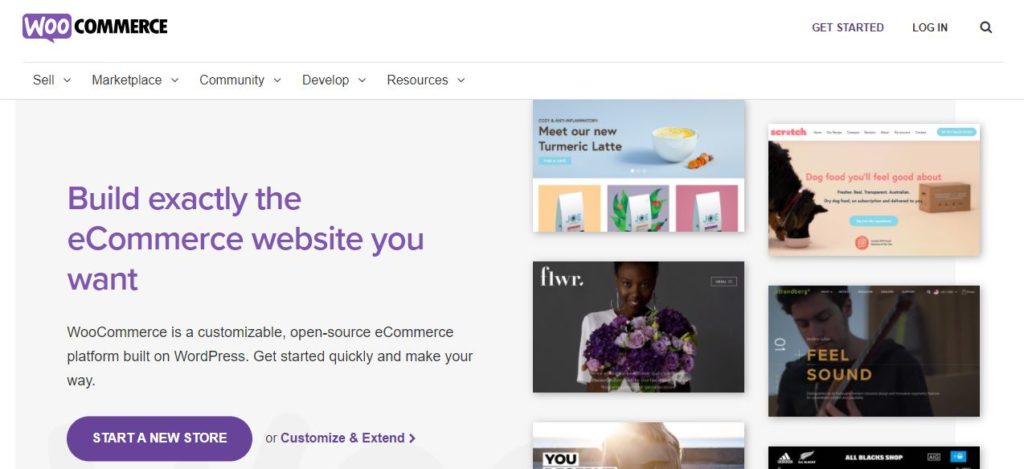
The WordPress eCommerce platform is available in more than 60 languages. A WordPress plugin called WooCommerce allows you to turn your site into a fully functional online store.
It’s easy to integrate WooCommerce with third-party WordPress plugins as well as WooCommerce extensions, which is one of its most appealing features. PayPal, BACS, and credit cards are all payment methods that are accepted by WordPress.
Pros
- Open-source and free
- Community of developers with active members
- Exceptional SEO features
- Compatible with other WordPress plugins
- A wide selection of themes is available
Cons
- Not suitable for beginners
- No central support
- The cost of maintenance can easily add up
Pricing
Available for free, with add-ons and extensions.
6. Ecwid
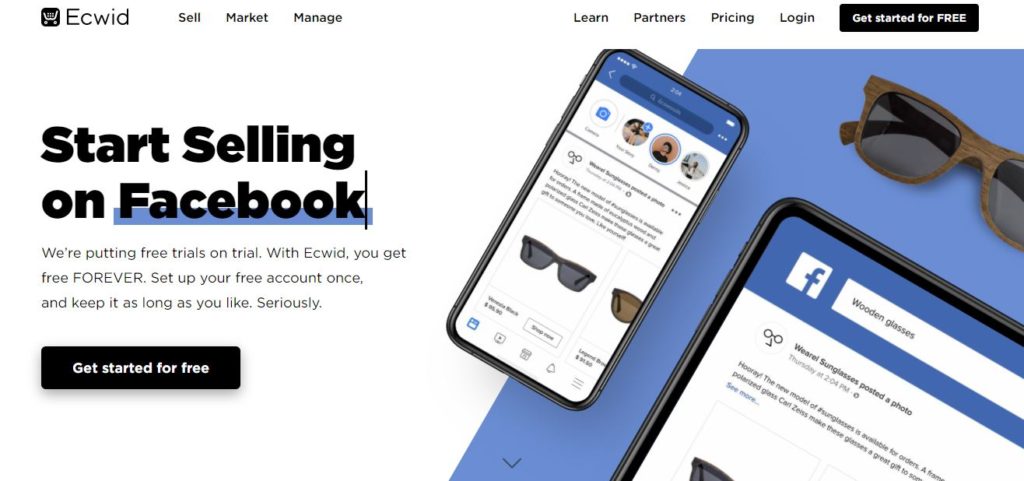
Ecwid was founded in 2009 by Ruslan Fazlyev, who had previously founded X-Cart. It has since become an eCommerce website builder comparable to most other Ecwid competitors.
The Ecwid platform has many features that make it easy to run an eCommerce store, including shipping labels, email storage, a built-in blog, cross-promotions, upsells, and product ratings.
You don’t have to worry about SSL certificates, updates, or security because the platform takes care of all of them. Besides web hosting, Ecwid also offers servers for all of its customers.
Pros
- Easy to use
- SSL certificate
- The free plan offers limited design options
Cons
- The free plan has limited features such as SEO editing
- No phone support available for free plans
- Requires third-party services for payment gateway
Pricing
Ecwid offers three paid and one free pricing tiers.
- The completely free plan
- Venture: starts at $15/month
- Business: starts at $35/month
- Unlimited: starts at $99/month
7. Volusion
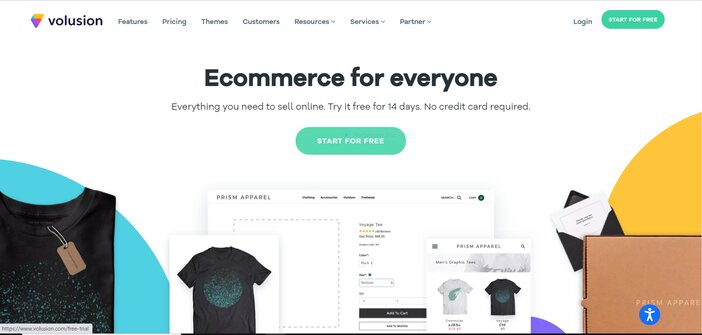
Volusion is one of the best eCommerce platforms that provides eCommerce services to several big and small enterprises. With its SSL certificate, third-party apps, and safe payment methods, the application ensures a worry-free client experience.
However, to use the multi-channel capabilities provided by Volusion, you’ll have to buy higher-priced plans. The company integrates with eBay, Google Product Data Feed, and Amazon.
Pros
- Multiple payment options
- Offers a POS (Point of Sale) solution
- A secure socket layer (SSL) certificate
- Mobile app available
- Free theme
Cons
- Extra cost for SSL certificate
- There are no blogging features
Pricing
Volusion offers four pricing options. The platform does not have a free plan but offers a14 days free trial.
- Personal plan: starts at $29/Monthly
- Professional plan: starts at $79/Monthly
- Business plan: starts at $299/Monthly
- Prime plan: customized
You will get a 10% discount when you subscribe for one year upfront on any plan.
8. 3dcart
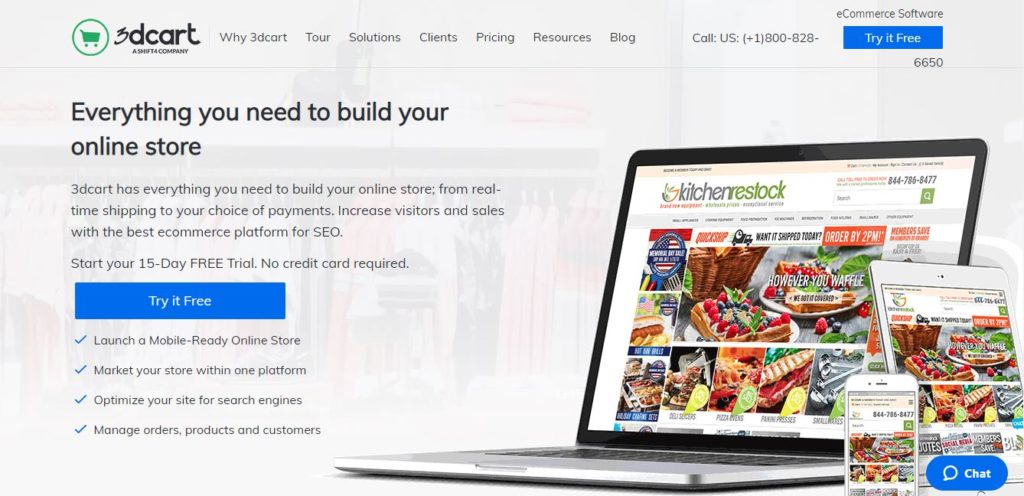
The 3dcart eCommerce platform has features that let businesses set up online stores, sell products, and accept payments, as well as fulfill customer requests. For any additional feature you need for your online store, you can find it in 3dcart’s app store.
3dcart enables multi-channel eCommerce, enabling you to advertise on eBay, Amazon, Google, Facebook, and Shopzilla. You can sell both digital and physical products with 3dcart, and it supports a variety of fulfillment options such as downloads, normal delivery, and drop shipping.
Pros
- SEO features
- Free plan for US-based users
- No transaction fees required
- Free themes available
Cons
- Not beginner-friendly
- Relatively expensive compared to alternatives
- No mobile app available
- Potential issues when upgrading
Pricing
Before you commit to 3dCart, you can take advantage of a 15-day free trial.
- Nano plan: starts at $9.99/month
- Mini plan: starts at $19.99/month
- Starter plan: starts at $35.99/month
- Professional plan: starts at $65.99/month
- Professional plus plan: starts at $99.99/month
9. Magento

Magento is among the most popular and powerful eCommerce platforms. It has a wide range of extensions for almost every required functionality. It has a dropshipping feature and also gives users tools to manage their products as well as the general inventory.
From marketing to inventory management, Magneto is a great tool that integrates everything under the same platform. Although it is a very user-friendly platform, it is not that simple to install and configure.
Pros
- A large community and user base
- High flexibility and scalability
- Powerful features
- SEO-friendly
- One-click sales
- The software can be hosted anywhere you want
Cons
- Expensive themes
- Sometimes slow
- It requires development skills
- The support is almost non-existent
- Performance is highly dependent on memory and space
Pricing
- Trial period: No
- Magento open source: downloadable for free. You will, however, need to pay for both the hosting and add-ons for your site.
- Magento Commerce: enterprise-level software. A sales representative quotes prices that range from $15,000 to $50,000 per year.
10. Big Cartel
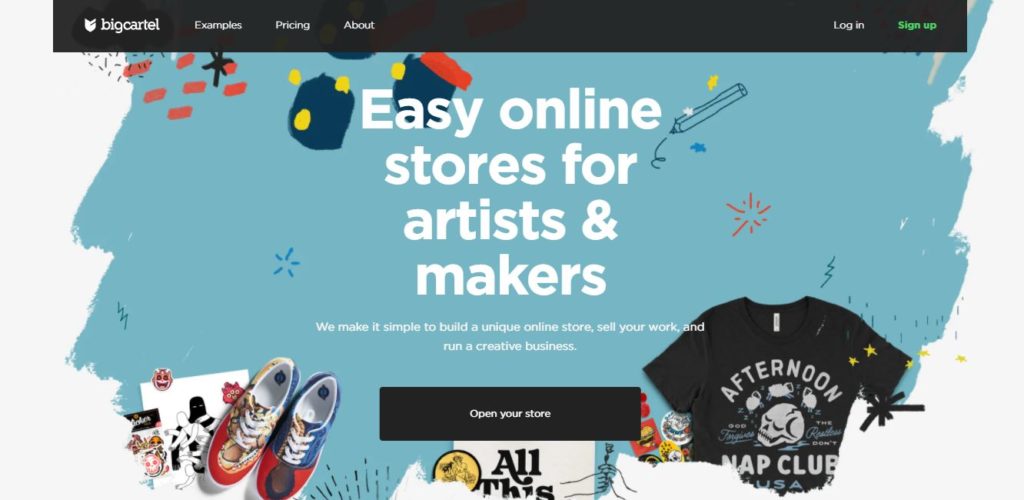
Big Cartel is a free eCommerce builder that allows you to create an online store. This platform assists independent artists, photographers, craftsmen, bakers, authors, and other types of creators in their efforts to create and sell items that they believe in.
Big Cartel doesn’t have a long list of distinguishing traits to boast about. The platform does not charge an additional cost for payment processing and accepts credit card payments via Stripe and PayPal.
The Big Cartel iOS app can also be used to receive payments in person. With the help of Zapier, Big Cartel allows you to integrate with third-party apps such as Stripe, MailChimp, and PayPal.
Pros
- Easy to use
- Suitable for beginners
- Offers an unlimited free plan
Cons
- Lacks advanced features available provided by most competitors
- Limited customization
Pricing
- Gold: free
- Platinum: starts at $9.99/month
- Diamond: starts at $19.99/month
- Titanium: starts at $29.99/month
Tips on choosing an eCommerce platform
1. Look for a platform that gives you complete control
For eCommerce merchants, total control and flexibility are the names of the game. From the site’s appearance down to its underlying code, an ideal platform offers you maximum control over each aspect.
Look for a platform that gives you access to its full CMS capabilities so you can customize certain areas of your website as needed.
2. Make sure the eCommerce platform is reliable
So you’ve decided that an eCommerce platform is the right choice for your business. Awesome! Next, make sure it’s reliable. A business owner should scrutinize the eCommerce platform provider to ensure that the services are offered by a credible company.
It is important to investigate if one can be matched with a well-established company that offers a reliable service. Each platform will have its maintenance fees and third-party integrations which can be costly, so make sure it’s scalable.
3. Ease of use and adoption should be checked
The core function of eCommerce platforms is to serve as a bridge between your customers and you. It enables customers to purchase online from almost anywhere they are, while also functioning as a marketing tool that can help woo clients via the Internet.
Ease of use and adoption should therefore be checked beforehand. In a situation where customers feel that the application is too complicated or even cumbersome, they quickly lose interest in using your product.
Your product might have the best security and safety features, but if it’s hard to use, the customers will decide to choose other products that are easier to use.
4. Check the available support and service packages
A good eCommerce platform will cover all the aspects of our online store from managing products, vendors, customers to managing advertising campaigns as well as international expansion.
The main negative of choosing the right product for your online store is not being able to use or update it in time. To avoid that, you need to check the available support and service packages offered by the product provider and decide if they are appropriate for you.
5. Budget matters a lot, look for free or cheap alternatives
When you run an online business, it is very important to know your budget. The most expensive option is not always the best, so before you choose a product you should make sure to look for free or cheap alternatives.
Oftentimes, we waste our money on products that we could have easily obtained for free or at a lower cost. Finding alternative solutions and creative ways to optimize your projects can assist in keeping costs down, which is the key to any successful business.
FAQs
How much inventory do I need to start an eCommerce business?
You don’t need a lot of inventory to start an eCommerce business. The type of products you sell will determine how much inventory you need. A good rule of thumb is to only order enough products that you would sell in the first month and a half.
When starting, it’s best to lower your investment and keep things simple. Of course, as your business grows your inventory will also grow, but there is no need to go overboard when first starting.
What type of products can I sell?
As long as your product is legal, I encourage you to sell just about anything. From big/heavy items (furniture, cars, boats) to small/lightweight items (strings of pearls, pens, towels).
You are in complete control of what you sell on your online store. From physical products to digital products, eBooks, etc.
Do I need a high-end PC to run the eCommerce platforms?
Nope! Most eCommerce platforms can be run on any current/modern computer or mobile device, even your smartphone. Allowing you the freedom to sell virtually anywhere.
How much should I expect to pay?
The right platform at the right price: It’s always a little tricky to pin down exactly how much an e-commerce platform will cost you. Prices often depend on the volume of traffic and the specific requirements of each customer.
Nonetheless, you can pay anywhere from $0 for a free platform, to more than $50,000 for the most expensive eCommerce solutions.
Will I need any web design skills to use these platforms?
All of the eCommerce platforms mentioned above are designed to be easy to use and work without any web design skills.
They also offer many different pre-made templates and designs that you can modify and customize, making them fantastic choices for any online store regardless of your skill level.
Conclusion
In conclusion, choosing the right eCommerce platform can be tricky. There are lots of choices out there and you want to make sure you choose the right one as it can have a big impact on your business.
The choice will vary based on what you want to build. I’ve walked you through some of the top contenders and how to choose your ideal option. Here is my opinion on the best eCommerce platforms.
I would recommend BigCommerce as a good choice for those who are starting small and plan on scaling soon. Squarespace or Wix are viable options for those who sell or wish to sell large quantities.
If you are a dropshipper, I recommend Shopify. The BigCartel platform is great for selling arts and crafts, and for selling a few items per month. For overachievers such as myself who aren’t afraid to get their hands dirty or who are knowledgeable about some web-based applications, I recommend Woocommerce.
For more information about the best products and services that will help you with your online business and with your blogging needs, check out the blog. I appreciate you taking the time to read this article.
